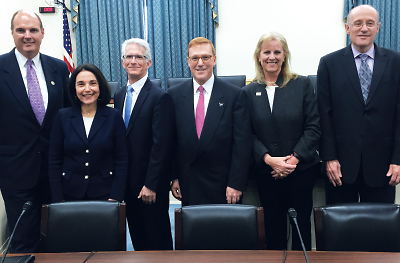“The criminalization of mental illness is a national tragedy,” APA President Renée Binder, M.D., told an audience gathered October 29 for a congressional briefing on Capitol Hill.
During the event, which was sponsored by APA, Binder, a forensic psychiatrist and a professor of psychiatry at the University of California, San Francisco, School of Medicine, spoke of the numerous challenges people who are living with mental illness in U.S. jails and prisons face.
According to Binder, an estimated two million people with serious mental illness are admitted to U.S. correctional facilities each year. Once incarcerated, these inmates often spend more time behind bars than other members of the prison population, in part because they incur more infractions there and are more vulnerable to victimization. They are also more likely to return to the criminal justice system after release.
U.S. correctional facilities are often ill-equipped to offer appropriate mental health treatment options for inmates, meaning that those with mental illness often face numerous hurdles to receiving adequate care.
The strain of coping with the mental health needs of prisoners falls heavily on the 3,069 U.S. counties that have to maintain and staff their jail systems. This must change, said Binder and other speakers at the briefing.
“We are spending way too much on incarceration,” said Ron Honberg, J.D., the national director for policy and legal affairs at the National Alliance on Mental Illness, during the briefing. “It is more effective to spend money on treatment to keep people out of jail.”
Rich Stanek, the sheriff of Hennepin County, Minn., who also spoke at the briefing, agreed: “I understand how we got here, but I don’t understand why we stay here.” Stanek said he would like to see more inpatient psychiatric beds available so that inmates could receive psychiatric evaluations sooner and not languish in jail—often for longer periods of time than most who are sentenced for low-level misdemeanors.
Improvements to the information-sharing system that allows legally appropriate communication between providers, agencies, and the criminal justice officials could better direct police or sheriff’s deputies when they encounter someone with a mental illness, Stanek said.
“The correctional environment is not the place to treat people with mental illness,” said Robert Trestman, M.D., Ph.D., a professor of psychiatry and medicine at the University of Connecticut. To reduce recidivism in this population, Trestman said strong discharge planning and transition resources are essential. “We must not do harm by getting people out of jail without getting them into care,” he said.
“Local and state leaders must join with criminal justice, mental health, and substance use professionals to steer and support long-term efforts to move mental health care from our jails to the community,” said Mary Ann Borgeson, who has served as the county commissioner in Douglas County, Neb., for 21 years. “But, we can’t do it alone. We need federal leadership, and we ask Congress to make the efforts needed to reduce the criminalization of people with mental illness.”
The American Psychiatric Association Foundation, the National Association of Counties, and the Justice Center of the Council of State Governments have joined together to create the Stepping Up Initiative, intended to reduce the number of persons with mental illness in the nation’s jails (
Psychiatric News, June 5). The initiative will convene a national summit conference in April 2016 to develop strategies to help counties move toward that goal.
Some counties have already begun to make changes by modifying arrest policies and law enforcement training, establishing mental health courts, and developing re-entry supported housing programs.
“We need to give local jurisdictions help to decrease the number of people with mental illness behind bars,” Binder urged the audience, noting the array of bipartisan mental health reform bills already proposed in both the House and Senate. These include the Comprehensive Justice and Mental Health Act, the Comprehensive Addiction and Recovery Act of 2015, the Helping Families in Mental Health Crisis Act of 2015, and the Mental Health Reform Act of 2015.
“APA has taken the lead in collaborating with leaders in Congress toward the furtherance of these goals, but we can’t do it alone,” Binder wrote in a related blog post. “I urge you to get involved with your state and local legislature and communicate to them the unique issues that your community faces in regards to the criminalization of people with mental illness.” ■
Binder’s blog post “Working to Decriminalize Mental Illness” can be accessed
here.


